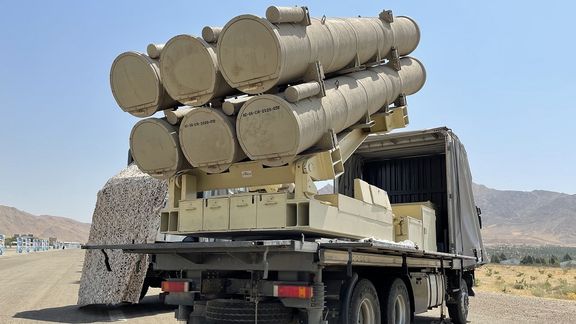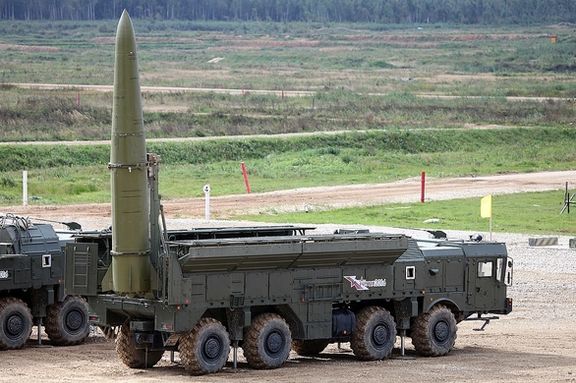Iran denies plans to supply missiles to Russia

Iran’s UN representative has denied a Reuter’s report on Friday which said that Iran is planning to supply hundreds of missiles to Russia for its war in Ukraine.

Iran’s UN representative has denied a Reuter’s report on Friday which said that Iran is planning to supply hundreds of missiles to Russia for its war in Ukraine.
"Legally, Iran has no restrictions or prohibitions on buying or selling conventional weapons. But morally, Iran will avoid transferring any weapons, including missiles, that may be used in the conflict with Ukraine until it ends," Iran’s UN representative said.
Two European sources told Reuters that dozens of Russian military personnel are being trained in Iran to use the Fath-360 close-range ballistic missile system, adding that they expected the imminent delivery of hundreds of the satellite-guided weapons to Russia for its war in Ukraine.
Some experts compare the Fath-360 truck-mounted missiles, that come in batches of six, to the US HIMARS rockets, although their overall range and accuracy is less.
Russian defense ministry representatives are believed to have signed a contract on Dec. 13, 2023 in Tehran with Iranian officials for the Fath-360 and another ballistic missile system built by Iran's government-owned Aerospace Industries Organization (AIO) called the Ababil, said the two intelligence officials, who requested anonymity in order to discuss sensitive matters.
The sources did not specify an exact timeline for the delivery of Fath-360 missiles but but said it would be soon.
The officials highlighted that Russian personnel have visited Iran to learn to operate the Fath-360 defense system. One of the sources said that "the only next possible" step after training would be actual delivery of the missiles to Russia.
The Fath-360 defense system launches missiles with a maximum range of 120 km (75 miles) and a warhead of 150 kg, while the Russian-manufactured Iskander-M ballistic missiles have a a range of 500km, but harder to operate. Iskander is also truck mounted but comes in one or two salvos.

The supply of Fath-360s could allow Russia to use more of its own arsenal for targets beyond the front line, while employing Iranian warheads for closer-range targets, a military expert told Reuters.
A spokesperson for the US National Security Council told Reuters that US and its NATO allies and G7 partners "are prepared to deliver a swift and severe response if Iran were to move forward with such transfers."
It "would represent a dramatic escalation in Iran's support for Russia's war of aggression against Ukraine," the spokesman said. "The White House has repeatedly warned of the deepening security partnership between Russia and Iran since the outset of Russia's full-scale invasion of Ukraine."
A senior Iranian official, speaking on condition of anonymity, told Reuters that while Iran has not supplied Fath-360 missiles, they have sold other missiles and drones to Russia. The official emphasized, "How each country uses this equipment is entirely their decision," stressing that Iran did not sell weapons to Russia for use in the Ukraine war.
Iran's semi-official Tasnim news agency said in July 2023 the system had been successfully tested by the country's Islamic Revolution Guards Corps (IRGC) Ground Force.
Iran has supplied hundreds of Shahed drones to Russia since mid-2022, which have been extensively utilized for targeting civilian infrastructure and urban areas in Ukraine with NATO calling on Tehran to stop its military cooperation with Moscow.
The Shahed drones, however, carry a fraction of the explosives in comparison to the Fath-360 missiles and are easier to shoot down as they are slower than ballistic missiles.
The US, UK, and Canada imposed new sanctions on Iran’s drone industry in April this year, targeting Iranian drones, including their use by Russia in the war in Ukraine.
However, despite global sanctions, Iran imported at least $10 million worth of drone engine parts from countries including China, Turkey, the UAE, Germany, and even the US.
Data from Iran's customs organization, analyzed by Iran International, showed that several items listed under a US advisory guide were imported in the first two months of the current Iranian year, which began on March 20.
In July this year, NATO leaders accused Iran of "fueling Russia’s war of aggression against Ukraine by providing direct military support to Russia, such as munitions and uncrewed aerial vehicles (UAVs), which seriously impacts Euro-Atlantic security and undermines the global non-proliferation regime."